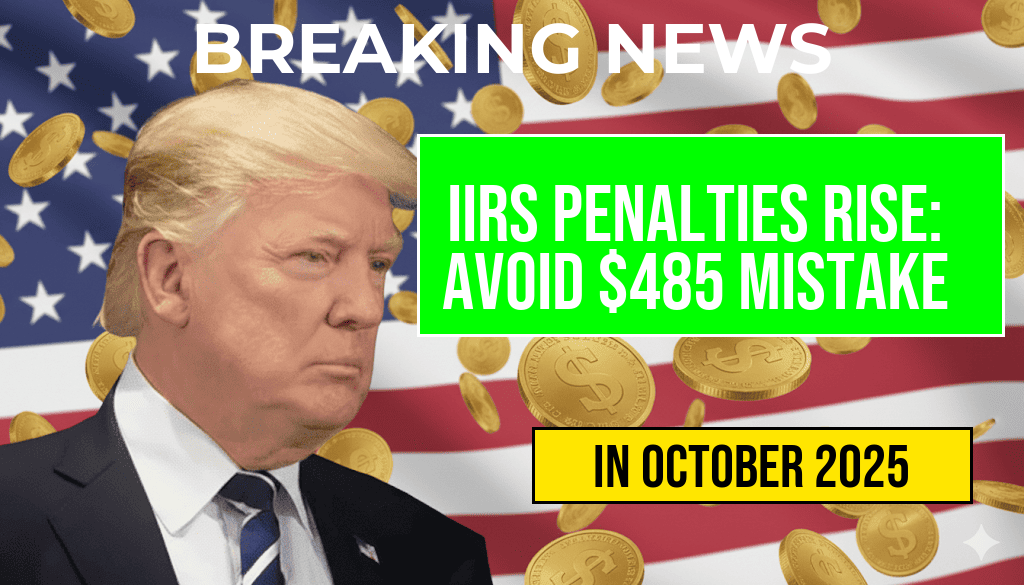The Internal Revenue Service (IRS) is gearing up for significant changes in its penalty structure for late tax filings, which are set to take effect in 2026. Taxpayers who fail to file their returns on time could face a steep increase in penalties, with fines potentially rising to $485 for each month a return is overdue. This shift underscores the importance of timely filing and the need for taxpayers to stay informed about their obligations. The IRS aims to encourage compliance and ensure that all taxpayers meet their responsibilities, but the new penalties could catch many off guard. With tax season approaching, understanding these changes is crucial for individuals and businesses alike.
Understanding the New Penalty Structure
Starting in 2026, the IRS will implement a revised penalty framework that significantly increases the cost of late filings. Currently, taxpayers face a penalty of 5% of the tax due for each month a return is late, capped at 25%. Under the new rules, the penalty structure will shift to a flat fee, with the potential for more severe outcomes depending on the duration of the delay.
Details of the Penalty Increase
| Delay Duration | Current Penalty | New Penalty (2026) |
|---|---|---|
| 1 Month | 5% of tax due | $485 |
| 2 Months | 10% of tax due | $970 |
| 3 Months | 15% of tax due | $1,455 |
| 4 Months or more | 25% of tax due (max) | $2,425+ |
Strategies to Avoid Penalties
Taxpayers can take several proactive steps to steer clear of these new penalties:
- File Early: Submitting your tax return well in advance of the deadline can help avoid the rush and reduce the chances of missing the filing date.
- Seek Professional Help: Consulting a tax professional can provide clarity and assistance in navigating complex tax situations, ensuring all forms are accurately completed.
- Utilize IRS Resources: The IRS offers various tools and resources for taxpayers, including online filing options and access to tax guides that can aid in understanding obligations.
Potential Impacts on Taxpayers
The increased penalties could have far-reaching effects, particularly for low- and middle-income taxpayers who may already be struggling to make ends meet. The flat fee structure could disproportionately affect those with lower incomes, as the penalty represents a larger percentage of their overall tax burden. Additionally, small business owners, who may face varying income levels throughout the year, might find it challenging to manage their tax filings under the new regime.
What to Do if You Miss the Deadline
If you find yourself unable to file on time, it’s essential to act quickly:
- File for an Extension: The IRS allows for filing extensions, giving taxpayers an additional six months to submit their returns. However, this does not extend the deadline for paying any taxes owed.
- Pay What You Can: Even if you cannot pay your total tax bill, paying a portion can help reduce penalties and interest.
- Communicate with the IRS: If you anticipate difficulties in meeting your obligations, contact the IRS to discuss your options and avoid potential penalties.
Staying Informed
As the IRS prepares to implement these changes, staying informed is crucial for all taxpayers. Understanding the potential penalties can help prevent costly mistakes as 2026 approaches. For further information, taxpayers can visit the IRS website or consult reputable financial news sources. Keeping abreast of these developments will ensure that individuals and businesses are well-prepared for the upcoming tax seasons.
For more detailed tax information, consider visiting IRS.gov or checking out articles on Forbes.
Frequently Asked Questions
What is the IRS late-file penalty that will increase in 2026?
The IRS late-file penalty is a fee imposed on taxpayers who fail to file their tax returns by the due date. Starting in 2026, this penalty is set to increase to $485 for individuals who file their returns late.
How can I avoid the increased late-file penalty?
To avoid the increased late-file penalty, ensure that you file your tax return by the due date or apply for an extension if needed. It is crucial to stay informed about tax deadlines to prevent unnecessary fees.
Are there any exceptions to the late-file penalty?
Yes, there are certain circumstances that may provide relief from the late-file penalty, such as serious illness or natural disasters. Taxpayers who believe they qualify for an exception should consult the IRS guidelines or a tax professional.
What should I do if I can’t pay my taxes on time?
If you cannot pay your taxes on time, it’s still important to file your return to avoid the late-file penalty. You can explore payment plans or options such as an Installment Agreement with the IRS to manage your tax liabilities.
When will the new late-file penalties take effect?
The new late-file penalties will take effect in 2026. Taxpayers should prepare for this increase by filing on time and staying informed about any changes to tax regulations.






